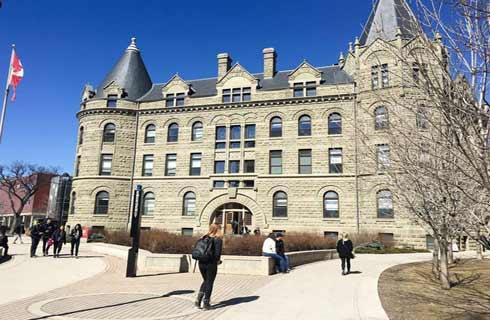- IDP China>
- 课程库>
- 自然科学>
- 生物与生物医学科学>
- 分子药理学>
- Doctor of Philosophy in Pharmacology- Molecular Neuropharmacology
药理哲学博士-分子神经药理学
Doctor of Philosophy in Pharmacology- Molecular Neuropharmacology

学历文凭
Ph.D.

专业院系
Department of Pharmacology

开学时间

课程时长

课程学费

国际学生入学条件
A Grade Point Average (GPA) of 3.0 or higher (on a 4.0 scale) for the upper division of the undergraduate course work. An undergraduate major or specialized work in biological sciences or chemistry is preferred.
A personal statement that includes applicant research experience, current research interests, plans after graduate school and the reasons for choosing the Department of Pharmacology at Wayne State.
Three letters of recommendation from persons able to judge the applicant's potential in graduate school.
Official copies of GRE scores (ETS institutional code:1898, departmental code:0216) taken within the last three years (GRE is optional, but may assist in the application decision).
Official copies of all academic transcripts.
Official copies of scores from the TOEFL (institutional code:1898). Minimal TOEFL scores are 600, 250 and 100 for the paper-, computer- and internet-based tests, respectively.
IDP—雅思考试联合主办方

雅思考试总分
6.0
- 雅思总分:6
- 托福网考总分:100
- 托福笔试总分:600
- 其他语言考试:NA
CRICOS代码:
申请截止日期: 请与IDP联系 以获取详细信息。
课程简介
The doctoral program in Pharmacology now includes a University-approved Concentration in Molecular Neuropharmacology. The focus of this Concentration is to provide training in the molecular aspects of neuropharmacology, with an emphasis in molecular signaling and functional genomics. The Department is now actively recruiting competitive, highly motivated graduate students for training in this unique and topical discipline. The sequencing of the human genome, and of animal species used to model human disease and therapeutics, has revealed some critical gaps in the training of most biomedical scientists. While many newly minted scientists are comfortable with at least some aspects of gene manipulation, few are as adept at analyzing the resulting changes in the organism and its response to the environment (i.e. phenotype). Pharmacologists, by the very nature of their discipline, determine the response of individual cells, tissues and/or organisms to changes in the internal and external environment (including therapeutic agents) and are thus in increasing demand in the 'post-genomic' era. Neuropharmacologists are especially in demand, given both the market value of current therapeutic drugs for CNS disorders and the rapid pace of discovery about basic neural mechanisms that has yet to be tapped for therapeutic purposes. At the same time, biomedical scientists are now acutely aware that there is, in fact, not a single human genome but myriad genomes comprised of countless DNA deletions, insertions, and single nucleotide polymorphisms which change the substrate upon which environmental factors act and also modify our response to therapeutic drugs. Neuropharmacology, in the post-genome era we have entered, thus encompasses both the effects of drugs on neural cell function as well as the influence of genetic variations (from snps to gene knockouts) on drug responses at the cellular and organismic level. In this context, application of molecular and genetic tools will provide critical insights into brain function and facilitate the development of novel therapeutics for brain dysfunction and tumors.
相关申请
 预科
预科 奖学金
奖学金 实习机会
实习机会 在校学习
在校学习 跨境学习
跨境学习 校园授课-线上开始
校园授课-线上开始 在线/远程学习
在线/远程学习
开学时间&学费
学费信息仅供参考,请与IDP联系以获取详细信息
| 开学时间 | 时长 | 学费 | 地点 |
|---|
学校排名

世界排名351
数据源:
泰晤士高等教育世界大学排名
关于韦恩州立大学

韦恩州立大学位于美国密歇根州底特律市,始建于 1868 年,是一所一流的城市研究机构。韦恩州立大学提供近 350 个研究领域,因此其课程范围适合许多学术兴趣和职业目标。学生选择韦恩州立大学的原因在于其卓越的学术成就、领先的研究和创新的方法。韦恩州立大学有 13 个学院提供全国排名靠前的课程,其教师也都是各自领域的佼佼者。该校有来自 80 个国家的近 1300 名留学生,男女生比例分别为 60% 和 40%。韦恩州立大学被认为是密歇根州最多元化的校园社区,因为其学生代表着广泛的社会经济背景和文化。韦恩州立大学的校友网络遍布全球,人数多达 30 万。该校共有500多个学生组织,其中包括希腊兄弟会和姐妹会以及众多国际团体,学生可以选择加入其中之一。无论学生想扩大自己的人际网络、与各自领域的其他学生联系,还是想加入某个兴趣爱好社团,学生处主任都将帮助学生想方设法在校园中寻找机会参与其中。韦恩州立大学的教育议程将 ''在实践中学习 ''放在首位,为所有学生提供实习、服务学习、研究助理等机会和一系列其他实践经验选择。福特汽车公司、通用汽车公司、Stellantis、Sakthi Automotive、Quicken Loans、Ally Financial 和 DTE Energy 等世界领先的知名企业都在该校附近,因此很容易获得宝贵的实习和培训机会。
本校相关课程

Master of Education in Art Education
学历文凭
Masters Degree
开学日期
课程费用总额


Education Specialist Certificate in Social Studies Education
学历文凭
First-Professional Degree
开学日期
课程费用总额


Education Specialist Certificate in Science Education
学历文凭
First-Professional Degree
开学日期
课程费用总额


Education Specialist Certificate in Reading, Language and Literature
学历文凭
First-Professional Degree
开学日期
课程费用总额


Education Specialist Certificate in Learning Design and Technology
学历文凭
First-Professional Degree
开学日期
课程费用总额


Education Specialist Certificate in Administration and Supervision
学历文凭
First-Professional Degree
开学日期
课程费用总额

其他相关课程

药理哲学博士
 达尔豪斯大学
达尔豪斯大学学历文凭
Ph.D.
开学日期
课程费用总额


药理学硕士
 达尔豪斯大学
达尔豪斯大学学历文凭
Masters Degree
开学日期
课程费用总额


药理学和治疗学理学硕士
 曼尼托巴大学
曼尼托巴大学学历文凭
Masters Degree
开学日期
课程费用总额


荣誉理学学士学位,药理学和生物医学毒理学
 多伦多大学
多伦多大学学历文凭
Bachelor Degree with Honours
开学日期
课程费用总额


生理学和药理学硕士
 韦仕敦大学
韦仕敦大学学历文凭
Masters Degree
开学日期
课程费用总额


生理学和药理学博士学位
 韦仕敦大学
韦仕敦大学学历文凭
Ph.D.
开学日期
课程费用总额










 美国
美国